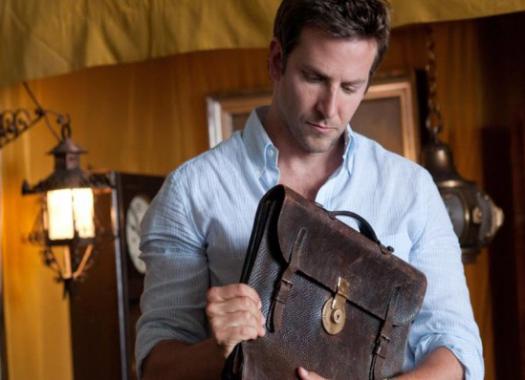Writing is rarely easy. Anyone who crafts prose, poetry, plays or screenplays can tell you that. And so many frustrated scribes–the renowned and the obscure alike–turn inward, producing self-reflexive meditations on the very process of writing itself. Film fans may be familiar with 2002’s “Adaption,” in which Academy Award-winning screenwriter Charlie Kaufman turned his struggle to adapt a book about orchids into a semi-autobiographical film about the creative process (and much, much more), as one notable– and surprisingly successful–example. But these self-referential meanderings rarely amount to anything but a momentary diversion, indulged only until the original creative difficulty or inspiration has passed.
Onerous as it can be to adapt any textual document into a visual medium like film, excessively literary source material poses unique challenges (consider for a moment how a film version of “Finnegans Wake” might work). In the face of these challenges, however, two unlikely screenwriters–Lee Sternthal (whose only prior film work was a story credit for 2010’s “TRON: Legacy”) and Brian Klugman (veteran bit actor of two decades of inconsequential roles)–have attempted to translate a predominantly literary experience to the silver screen with “The Words.” Unfortunately, this stodgy story-within-a-story-within-a-story is rife with clichés, and ultimately fails to offer any coherent statement on either writing or life in general.
Successful novelist Clayton Hammond (Dennis Quaid) is giving a public reading of his latest book, which tells the story of struggling writer Rory Jansen (Bradley Cooper) and his girlfriend, Dora (Zoe Saldana). When Rory’s first two novels fail to garner any attention from publishers, he is forced to confront the possibility that he lacks the requisite talent to make a living by writing. The chance discovery of a weathered manuscript in an antique leather satchel presents Rory with a dilemma. Surrendering to his dreams of literary virtuosity, Rory passes the found book off as his own work. It is swiftly published to critical acclaim.

During a break in his reading, Hammond meets aspiring writer and literary groupie Daniella (OliviaWilde), who wants to know more about the book. Shortly, we are back in Rory’s story, when he is approached by an unnamed old man (Jeremy Irons) who accuses him of plagiarism. Delving into our third level of narrative, the old man recounts the experiences that spawned the lost manuscript. We see his post-WWII romance with a French woman, the death of their daughter, and the breakup of their relationship. Rory comes clean, but his publisher convinces him to keep the theft quiet. Disgusted, Dora leaves Rory. Then we shift back to Hammond, who finishes his reading and is accompanied home by Daniella, who wants answers.
A full catalogue of all of the missteps within “The Words” would fill five times this space, but the few most glaring are enough to condemn the film. First, and most troublesome, is the utter lack of vivid language throughout. We get plenty of flat voice-over narration from Dennis Quaid that baldly over-explains the uncomplicated plot, and undercuts the earnest–but ultimately hamstrung–attempts by Cooper, Saldana and Irons to breathe some life into the script. Of course, you don’t want your ostensibly “written” lines to distract from the visual action, but to ascribe such flavorless writing to these literary characters is embarrassing.
 The other major flaw is the structure itself. Two parallel stories are certainly doable, but the third–and, if we are to buy the reactions of Rory and the old man, the most critical–gets short shrift (the film runs just 96 minutes). Since we’ve only spent a scarce few moments with these characters, flaunting the death of a child just isn’t sufficient alone to generate pathos, and all the soft piano music in the world won’t evoke viewers’ involvement if the characters are so thinly drawn. One of the cardinal rules of good writing is “show, don’t tell,” but we are left to hear of all of the impactful moments of the story second-hand.
The other major flaw is the structure itself. Two parallel stories are certainly doable, but the third–and, if we are to buy the reactions of Rory and the old man, the most critical–gets short shrift (the film runs just 96 minutes). Since we’ve only spent a scarce few moments with these characters, flaunting the death of a child just isn’t sufficient alone to generate pathos, and all the soft piano music in the world won’t evoke viewers’ involvement if the characters are so thinly drawn. One of the cardinal rules of good writing is “show, don’t tell,” but we are left to hear of all of the impactful moments of the story second-hand.
Avid readers and moviegoers will find nothing new or compelling about “The Words,” and the only people who might be surprised by its rote storytelling won’t have any interest in seeing it. If you’re looking for a quality film about writing, try the warm, heady “Wonder Boys” (2000) or the offbeat “Stranger Than Fiction” (2006) instead.
-by Demian Morrisroe


